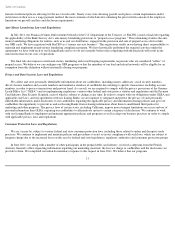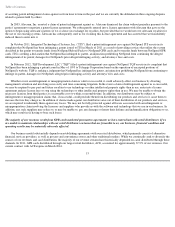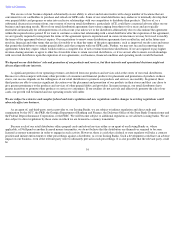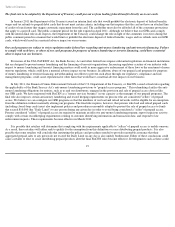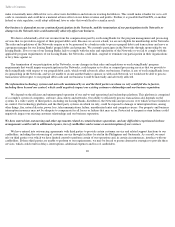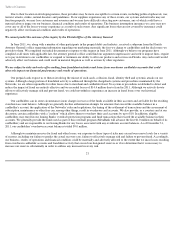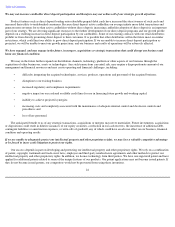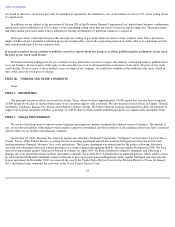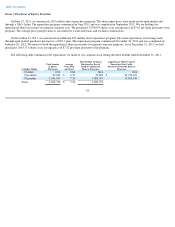NetSpend 2011 Annual Report Download - page 22
Download and view the complete annual report
Please find page 22 of the 2011 NetSpend annual report below. You can navigate through the pages in the report by either clicking on the pages listed below, or by using the keyword search tool below to find specific information within the annual report.
Table of Contents
The providers of alternative financial services that distribute our products are subject to extensive and complex federal and state
regulations and new regulations and/or changes to existing regulations could adversely affect their ability to offer our GPR cards through
their locations, which in turn could have an adverse impact on our business.
Our retail distributors include a large number of companies in industries that are highly regulated, such as payday lenders and other
alternative financial services providers. It is possible that changes in the legal regime governing such businesses could limit their ability to
distribute our products or adversely impact their business and thereby have an indirect adverse impact on our business. For example, a large
number of states have either prohibited, or imposed substantial restrictions upon, the offering of "payday loans" and this activity continues to
draw substantial scrutiny from federal and state legislatures, regulatory authorities and various consumer groups. Furthermore, the federal
financial reform legislation enacted in July 2010 grants supervisory authority over entities engaged in this activity to the Consumer Financial
Protection Bureau, which is directed to promulgate regulations which may significantly impact the operations and/or viability of various
entities, including those engaged in the business of offering payday loans. As a number of our retail distributors, including our largest
distributor, ACE, are engaged in offering payday loans, further legislative and regulatory restrictions that negatively impact their ability to
continue their operations could have a corresponding negative impact on our ability to offer our GPR cards through their locations, potentially
resulting in a significant decline in our revenue.
We are subject to extensive and complex federal and state regulation relating to the distribution of our GPR cards through corporate
employers and new regulations and/or changes to existing regulations could adversely affect our business.
We understand that state banking departments, which are charged with regulating the business of money transmission, have traditionally
taken the position that the offering of payroll cards does not constitute money transmission and so we are not required to obtain a state money
transmission license in order to engage in this activity. However, there is a risk that a federal or state regulator will take a contrary position and
initiate enforcement or other proceedings against us or our Issuing Banks, which in turn could have an adverse impact on our business, even if
we were to ultimately prevail in such proceedings. It is also possible that we could be unsuccessful in making a persuasive argument that we
should not be subject to such licensing requirements and could be deemed to be in violation of one or more of the state money transmitter
statutes. Such a violation could result in the imposition of fines, the suspension of our ability to offer our GPR cards through corporate
employers in the relevant jurisdiction, civil liability and criminal liability, any of which would likely have a material adverse impact on our
revenues.
The use of payroll cards as a means for an employer to remit wages or other compensation to its employees or independent contractors is
also governed by state labor laws related to wage payments. Most states permit the use of payroll cards as a method of paying wages to
employees, either through statutory provisions allowing such use, or, in the absence of specific statutory guidance, the adoption by state labor
departments of formal or informal policies allowing for the use of such cards. Nearly every state allowing payroll cards places certain
requirements and/or restrictions on their use as a wage payment method, the most common of which involve obtaining the prior written consent
of the employee, limitations on payroll card fees and disclosure requirements. There is a risk that one or more states or state labor departments
that currently permit the use of payroll cards as a wage payment method will take a contrary position, either through revised legislation,
regulation or policies, as applicable, or will impose additional requirements on the provision and use of such cards, each of which could have
an adverse impact on our business.
18





